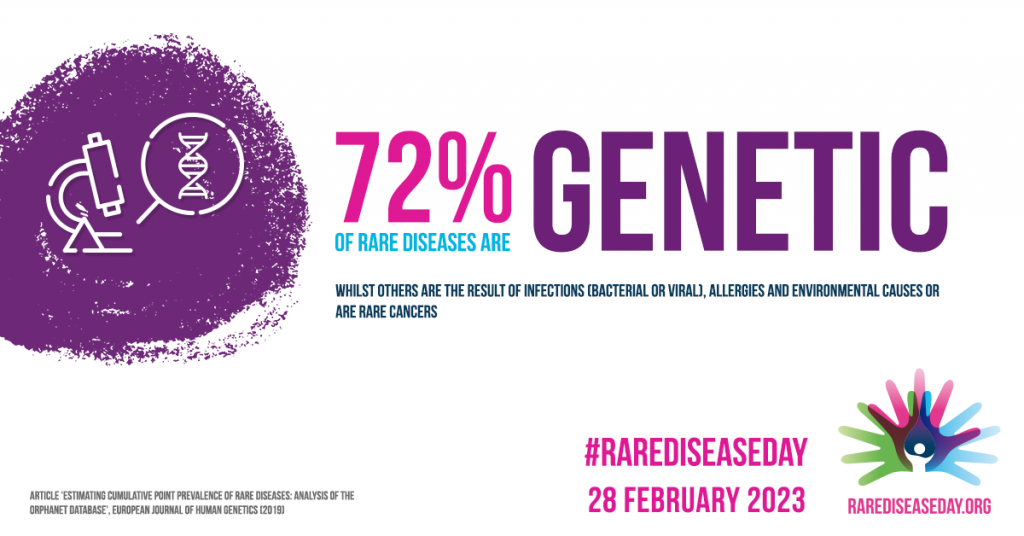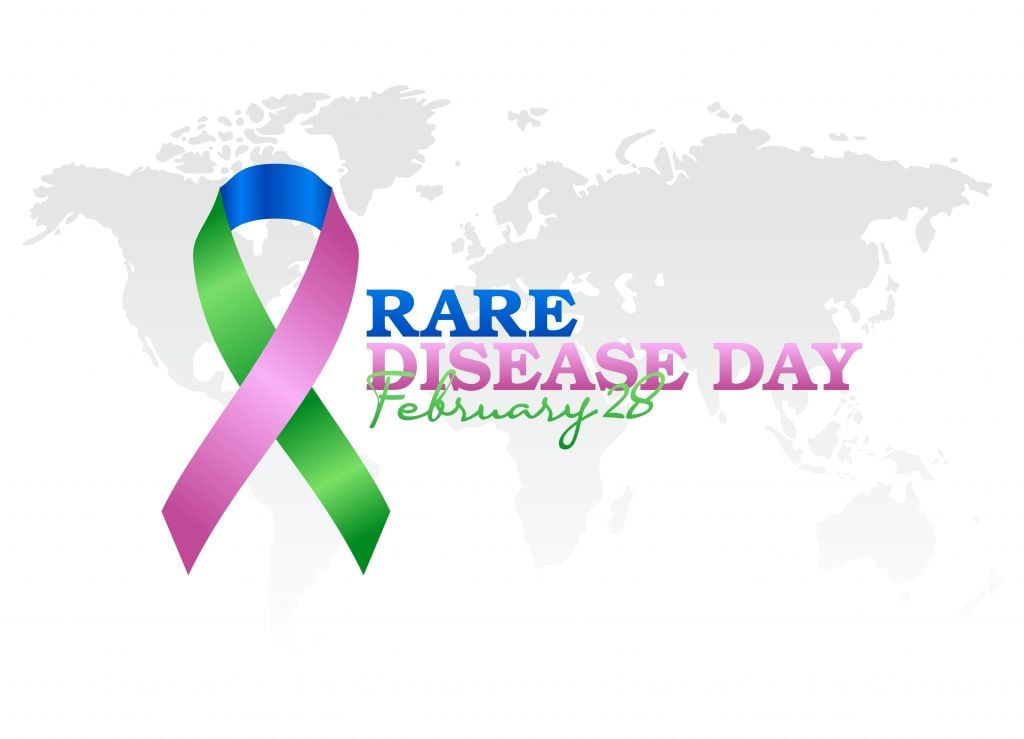Newsletter Signup - Under Article / In Page
"*" indicates required fields
Rare Disease Day 2023 is on February 28. The day is dedicated to raising awareness for the approximately 300 million people around the world living with a rare disease.
More than 6,000 rare diseases are characterized by a diversity of disorders and symptoms that vary not only from disease to disease, but also from patient to patient suffering from the same disease.
While cancer may not be considered to be a rare disease, one in every five cancers is rare. And 72% of rare diseases are genetic.
Due to their rarity, and the fact that some feature symptoms that are common to other more obvious diseases, misdiagnosis and delayed treatment are common. This can lead to many patients suffering from the stress of not knowing what is wrong, and being subjected to a barrage of tests, some of which may not be relevant.
The fact that there are often no existing effective cures for some of these conditions adds to the high level of pain and suffering endured by not only patients, but also their families.
When did Rare Disease Day start?
The first Rare Disease Day was put on the global calendar in 2008, when 18 countries observed the event. In 2023, more than 100 countries will participate, with more than 600 events taking place to raise awareness.

Rare Disease Day 2023: marking the event
To mark the event, the Rare Disease Diversity Coalition (RDDC) – an initiative of the Black Women’s Health Imperative – unveiled its new survey findings that reveal the current state of diversity, equity, and inclusion (DEI) practices and global initiatives of patient advocacy organizations. This in-depth report uniquely identifies gaps and develops recommendations related to outreach, education, and support among patients of color with rare diseases.
The RDDC chooses to release the report findings on the eve of International Rare Disease Day specifically, as it is a day to raise public awareness about global rare diseases and specifically the rare conditions affecting more than 30 million Americans – and a disproportionate number of patients of color.
“The RDDC provides a platform for historically underserved populations with rare diseases,” said executive director, Jenifer Waldrop, leader of the RDDC initiative.
“Through coalition building and using evidence-based solutions, the RDDC strives to alleviate the disproportionate burden of rare diseases and to address the disparate social, economic, and health effects of systemic racism.”
“Rare disease organizations are a lifeline for patients and their families,” Stephanie Marshall, co-chair of the Rare Disease Diversity Coalition Patient & Caregiver Working Group and director of patient advocacy at The Assistance Fund said.
“The Diversity, Equity, and Inclusion Efforts in Rare Disease Organizations Survey offers insights into current DEI practices in rare disease organizations and actionable recommendations to improve outreach, engagement, and communication to diverse populations.”
The event is also important insofar as many companies make announcements to coincide with Rare Disease Day. We have a list of companies with recent announcements in the field here.
Also, check our list of 10 biotech companies making waves in the rare disease space.
What are recent advancements in rare diseases?
“There are more than 8,000 known rare diseases that affect over 300 million people globally. Yet only a small percentage of these have treatments available,” Ashu Singhal, co-founder and president at Benchling, told Labiotech.
“But we’re beginning to see key advancements that are giving us all, especially those most impacted in this community, a reason to hope. Drug discovery systems are moving away from bespoke and iterative to a more scalable, repeatable process, thanks to the influx of technology.”
Singhal said one big hurdle has been that the outdated and disparate legacy data management systems used in R&D are not fit to handle the complexity of today’s modern therapeutics.
“In turn, this causes delays in the discovery of effective treatments as scientists are manually translating data between systems, causing roadblocks in identifying patterns that lead to scientific breakthroughs in rare diseases. For rare diseases which are often genetic, understanding genomes and the DNA they comprise of, is critical to providing accurate diagnoses and effective treatments – so this challenge of R&D data deluge is heightened.”
“Cloud R&D technology is revolutionizing this process, providing scientists with the ability to seamlessly track, share, and analyze large datasets. Modern approaches such as RNA-based therapeutics have the potential to transform treatments for diseases that have been notoriously difficult to target with antibodies or small molecules.” Singhal said.
“The ingenuity of this modality allows scientists to create more effective treatments for rare and ultra-rare conditions in unprecedented ways. The RNAi drug, Oxlumo — used to treat the rare kidney condition primary hyperoxaluria — is just one example of what can be achieved.”
Technological advancements that unlock and accelerate scientific research and drug discovery are critical to make breakthrough discoveries for rare diseases and ultimately, helping to save and improve patient lives,” Singhal concluded.
“Rare Disease Day is an important reminder to support and keep accelerating the extraordinary pace of innovation in tackling rare disease treatment and prevention.”
But it’s not just companies.
Rare Diseases Action Plan 2023 for England
A new Rare Diseases Action Plan for England was published on Rare Disease Day 2023 that aims to ensure those living with these conditions receive better care and treatment, fairer access to testing and have continued support.
This builds on the first Rare Diseases Action Plan for England published in 2022 which has developed digital tools to put information on rare diseases at the fingertips of healthcare staff and helped 1,000 new complex diagnoses for people with rare diseases to be made thanks to advances in genomic research, helping to inform appropriate clinical care for patients.
The new plan lists 13 actions that have been developed with the rare diseases community focussing on faster diagnosis, increased awareness of rare diseases among healthcare staff, better coordination of care and improved access to specialist care, treatments, and drugs.
Although rare diseases are individually rare, they are collectively common, with one in 17 people affected by a rare disease at some point in their lives, such as spinal muscular atrophy, hemophilia A, epidermolysis bullosa or Huntington’s disease. This new plan will increase data sharing so we can, for the first time, get a full picture of how people are tested for genetic diseases across England and help get patients a diagnosis faster.
The government is funding research and fostering collaborations to accelerate the understanding, diagnosis and therapy of rare diseases. These include the £12 million MRC-NIHR UK Rare Disease Research Platform and £790 million NIHR Biomedical Research Centres, many of which include a focus on rare disease research.
Philippa Farrant, adult support coordinator, Wolfram Syndrome UK, said: “I have been involved with the Rare Disease Framework work as a patient representative on the delivery group from when the report was first being written.
“It has been a privilege to work with all the agencies involved in putting this complex piece of work together. Seeing how we can achieve an effective and useful document going forward that not only reflects the official organizations and what they do, but takes into account the patient’s views to help shape the actions has been a really worthwhile time.
“For an orphan rare disease community that I represent with less than 100 people in the country, this Action Plan should mean a better quality of life, more information and more awareness to professionals so that our community is supported better and able to access all services required managing their complex condition.”
Republic of Ireland announcement for Rare Disease Day
The government in the Republic of Ireland has also launched its own plan.
Ireland’s Minister for Health, Stephen Donnelly, marked Rare Disease Day 2023 by announcing that his department is to develop a new National Rare Disease Plan.
Pledging support to people living with rare diseases, the Minister confirmed that work is due to commence on the new National Rare Disease Plan, in line with the commitment in the Programme for Government.
Improving and expanding the care and treatment of patients with rare diseases is a priority for the government, with work spearheaded by the HSE National Clinical Programme for Rare Diseases.
The government has also substantially increased funding for new innovative medicines for rare diseases, investing €100 million over the last three budgets.
During this time, more than 100 new medicines have been approved, including 34 orphan medicines to treat rare diseases.
In 2023, the government is committing €2.7 million to support the implementation of this strategy.
Oncology R&D trends and breakthrough innovations







